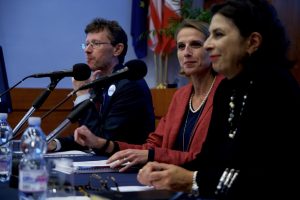WeWorld Index 2017: Women and Children Between Social Inclusion and Exclusion

Left to right: Stefano Piziali, JCU staff member Anna Colella, and Rita Mannella during the WeWorld Index Presentation
On Thursday, October 19, the JCU Service Learning Project welcomed Stefano Piziali and Rita Mannella for a lecture on “Children, Adolescents, and Women Between Social Inclusion and Exclusion.” Stefano Piziali is the Head of Advocacy at WeWorld Italy and Rita Mannella is the Head of Institutional Communication, Directorate General for Development Cooperation, Italian Ministry of Foreign Affairs and International Cooperation.
Stefano Piziali explained that WeWorld is an Italian Non-Governmental Organization (NGO) operating in the field of international cooperation and development, recognized by the Italian Ministry of Foreign Affairs. WeWorld operates in Italy, Asia, Africa and Latin America to support children, women, and local communities in the struggle against poverty and inequality. Piziali presented the 2017 We World Index, an annual report which analyzes the well-being and social inclusion of children, adolescents, and women. Through the acquisition of data, the Index studies inclusion as a multi-faceted phenomenon. “For the first time in the history of humanity, we have a plan to reach a multi-dimensional approach – addressing poverty from different fields, such as the economy, education, and health and well-being.” It is measuring not only economic parameters of a country, but also living conditions of women and adolescents.
Piziali discussed some of the data gathered by the Index in 2016. According to their estimates, women and children experience severe exclusion in 51 countries, while only 5% of them benefit from “good inclusion.” According to the report, Norway is the most inclusive country for women, adolescents, and children. However, Piziali remarked that although Northern Europe is at the top, the rest of Europe is not: 26 million Europeans under 18 are at risk of poverty and marginalization. Piziali concluded that the European Union is not addressing the problem effectively.
Rita Mannella explained that the Ministry of Foreign Affairs is very attentive to what NGO’s are doing. She described a few of the many projects the MAECI supports in developing countries, a significant number of which are focused on the key role women play in the local economy. Mannella also discussed inclusion and immigration in relation to women’s rights and conditions. In particular, she pointed out that 15% of all immigrants coming to Italy are women, and a vast majority of them turn to prostitution. Mannella concluded that spreading awareness about the importance of inclusion is already a step forward towards improving living conditions for women, children, and adolescents.





